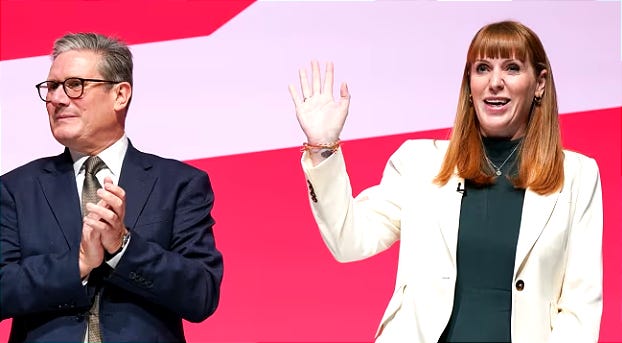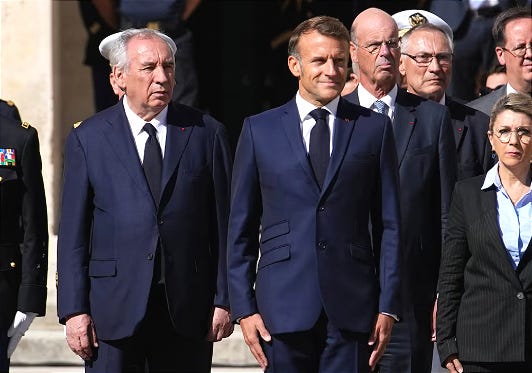Political Crisis Deepens in France, Starmer's Government in Peril as Deputy PM Resigns, US Threatens EU Over Google Fine, Uganda Accepts US Deportees, and More
Grinfi Political Risk Intelligence Briefing
Welcome to this week’s edition of Grinfi Political Risk Edge, your trusted source for expert political risk analysis and strategic intelligence. Thorough, insightful, and industry-focused. In this issue, we examine key geopolitical events shaping global markets and provide deep, beyond-the-headlines assessment. We deliver clarity in uncertainty and strength in decision-making. Anticipate, Adapt, and Excel!
But first, read our latest situation updates on Trump’s Supreme Court plea, along with commentaries on Bolsonaro’s trial and the state of Brazilian democracy, and on Trump’s satirically coded response to the Beijing parade.
Now, let’s begin the week with a laugh 😄 to brighten the mood.
Help us serve you better and improve Grinfi Political Risk Edge by taking this brief, fully anonymized reader survey.
"There is no tyranny more cruel than that which is perpetrated under color of the laws and in the name of justice."
Montesquieu, Considerations of the Causes of the Grandeur and Decadence of the Romans. Translated by Jehu Baker. D. Appleton and Company, 1882. Originally published in French in 1734.
Disclaimer: The opinion expressed in this quote does not represent our views but is intended for reflection purposes only.
From Grinfi Political Risk Observatory (GPRO), here’s what we’re monitoring:
High Impact Situational Updates
EXECUTIVE SUMMARY
Last week, several strategic events reshaped the global risk environment with direct consequences for security, markets, and regulation.
“At Grinfi, we track immediate/direct fragility and systemic contagion (cascading effect), ensuring leaders see risks before they spread.”
In the United States, the August labor report confirmed a sharp slowdown with only 22,000 new jobs created. This weakness reinforced expectations of earlier Federal Reserve easing, but tariff-driven inflation continues to cloud the policy outlook. Flows into Treasuries and gold reflected eroding confidence in U.S. growth momentum. Domestic politics amplified the sense of fragility. After a federal appeals court struck down most of his tariffs, President Trump has now formally appealed to the Supreme Court to intervene. The administration also rebranded the Department of Defense as the Department of War, a move widely viewed as symbolic, intended to signal a renewed focus on hard power. A separate executive order authorizing sanctions on states accused of unjustly detaining American citizens was signed by the president at the close of the week.

In Europe, Prime Minister Keir Starmer’s government in the United Kingdom contained the immediate fallout from Deputy Prime Minister Angela Rayner’s resignation with a cabinet reshuffle, but deeper fractures within Labour remain. Debt sustainability concerns re-emerged as gilt yields rose to multi-decade highs, narrowing fiscal space. France now faces a defining week as Prime Minister François Bayrou’s €44 billion deficit-reduction plan goes to a confidence vote. Failure would collapse his government and could trigger a fiscal shock propagation across the Eurozone, where bond spreads are already widening. At the same time, the European Parliament rejected key elements of the draft U.S.–EU trade framework, complicating ratification. Transatlantic tensions sharpened further after Brussels fined Google several billion euros over its advertising business, prompting threats of retaliation from Washington.
In Asia, Prime Minister Shigeru Ishiba of Japan faces a leadership challenge within the ruling Liberal Democratic Party. Markets reacted swiftly: the yen weakened and government bond yields surged to record levels, revealing concern that new leadership could pursue more expansionary fiscal and monetary policy, undermining the Bank of Japan’s credibility. China escalated its dispute with Brussels by imposing new tarriff on European pork, striking at a politically sensitive sector and pressuring European supply chains. At the same time, the expansion of the nuclear fuel sector poses sustainability risks, as industry leaders, including the World Nuclear Association, issue structural warnings about a potential uranium shortfall as reactor demand accelerates.

In Latin America, President Javier Milei of Argentina was undermined by a corruption scandal implicating his sister in alleged kickbacks from a pharmaceutical distributor. The revelations weakened confidence in his reform agenda and increased the risk of capital flight. In Brazil, the Supreme Court opened the trial of former President Jair Bolsonaro on charges linked to an attempted coup, prolonging political uncertainty in Latin America’s largest economy.
In Africa, Uganda’s agreement to accept U.S. deportees under a bilateral arrangement provoked domestic backlash. The decision has increased political speculation and tensions as the country approaches general elections, with observers concerned about President Museveni’s true intentions. Simultaneously, on September 6, multiple undersea cables in the Red Sea were cut, impacting key systems such as SMW4 and IMEWE near Jeddah and disrupting internet connectivity across the Middle East, South Asia, and parts of Africa. Microsoft Azure reported increased latency for traffic routed through the region as efforts to reroute and restore services were underway.
Global markets absorbed these shocks with a decisive shift toward caution. Equities came under pressure as trade disputes, weakening U.S. employment, and political crises converged. Gold and Treasuries gained on safe-haven demand, while emerging-market currencies and equities weakened. Oil markets remained finely balanced between slowing demand and elevated geopolitical risk, with OPEC Plus policy and U.S.–Venezuela tensions in sharp focus.


